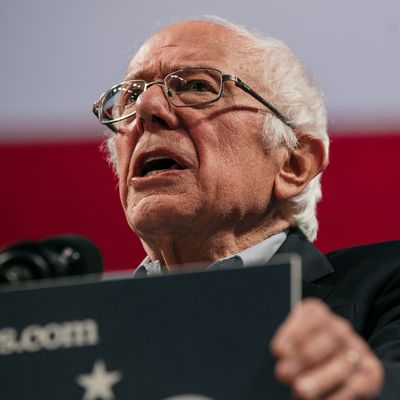
In the fond hopes of those who consider some sort of single-payer health-care system essential, 2020 once looked like the year that would give their movement a giant leap forward. Initially no fewer than 13 Democratic presidential candidates (Cory Booker, Pete Buttigieg, Bill de Blasio, Julián Castro, Tulsi Gabbard, Kirsten Gillibrand, Kamala Harris, Tim Ryan, Bernie Sanders, Tom Steyer, Eric Swalwell, Elizabeth Warren, and Andrew Yang) said they favored some sort of single-payer plan. Booker, Gillibrand, Harris, and Warren were original cosponsors of Bernie Sanders’s signature Medicare for All bill, an uncompromising version of single-payer, while Gabbard, Ryan, and Swalwell had co-sponsored the House counterpart bill.
But as the invisible primary segment of the 2020 cycle proceeded with its debates and fast-changing rivalries, support for Sanders-style M4A splintered, and public support for it declined significantly, too. The latter erosion of once-robust majorities favoring Sanders’s approach was likely attributable to a combination of relentless attacks from the health-care industry, and to a growing public understanding that “Medicare for All” really meant single-payer health-care, with no room for the private insurance policies that, after all, about 40 percent of Medicare beneficiaries had chosen through the Medicare Advantage option.
Partly thanks to debate moderator interest in sowing conflict among the Democratic candidates, hair-splitting over the details of various Medicare for All and then Medicare for Most proposals became and remained a prominent part of intraparty conflict. And before long, supporters of progressive candidates were using the health-care postures of their opponents to paint them as corporate sell-outs, while supporters of moderate candidates scored M4A as a general election loser. Far from ushering in a consensus for a big leap toward universal health coverage, the M4A debate has unsettled the Democratic Party on the one issue they think they “own” against Republicans. At least one major candidate, Kamala Harris, arguably ran a promising campaign right into the ground via feckless efforts to take and explain a more nuanced position.
As Vox’s Ezra Klein explains, M4A has become almost entirely a symbolic issue:
In Democratic Party politics, Medicare has become a which-side-are-you-on test. Are you with Sanders and the left, and against insurance companies, squishy moderates, commodified health care, and a politics of preemptive compromise? Or are you afraid that Sanders and the left are going to scare the country into reelecting Donald Trump and set health care reform back for a generation?
This is a fundamentally political question, and splitting the difference through complex acts of technocracy ends up alienating both sides.
That was definitely true of Kamala Harris’s proposal, and Elizabeth Warren’s transition plan to M4A was quickly attacked by hardcore single-payer fans as a sell-out. But as Klein notes, there’s an air of unreality about all these arguments, because M4A simply isn’t happening in the near-term:
The ferocity of this debate is at odds with the legislative reality. Even if a Democrat wins, Medicare-for-all will not pass the House and it will not pass the Senate. “I’m not a big fan of Medicare for All,” House Speaker Nancy Pelosi said. When I interviewed the key Senate Democrats who will write the next health reform bill, none of them supported Medicare-for-all or believed it could pass.
So are Democrats doomed to fight each other over M4A right up to and beyond the 2020 elections, feeding Republican attack lines on them as both feckless and socialistic?
Klein suggests a sort of Nixon-to-China solution: Anoint Sanders the nominee (or at least the chief Democratic spokesman on health-care, I suppose) as the one candidate with the progressive street cred to gently explain to single-payer advocates that compromise will be necessary:
Sanders also has a unique level of credibility with the party’s more ideological left wing. His commitment to Medicare-for-all is sufficiently steadfast that leftists will believe him if and when he has to convince them that the compromised bill Congress is prepared to pass is the best bill they’re going to get. He wrote the damn bill; he might be the only one who can cut the damn deal. And if Sanders was able to get an ambitious Medicare-for-more plan through Congress and make it look like a compromise, it’d be a tremendous legislative coup.
This does make some sense, because Sanders either has — or will have to — develop a Plan B when the pixie-dust “political revolution” he has claimed will suddenly sweep Congress toward M4A fails to materialize. But in the mean time, of course, making M4A official party gospel will expose the party to a multi-billion-dollar “no socialized medicine” campaign during the general election.
Perhaps it would be best for Democrats to muddle through the primaries while trying to keep differences on health-care policy from appearing as vast as the gulf between virtually all Democrats and virtually all Republicans. But if they do win, whether he’s president of the United States or simply a very distinguished U.S. senator, Bernie Sanders may still be called to the patriotic duty of explaining that the “political revolution” has its limits.






























